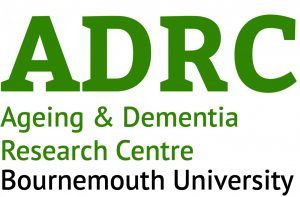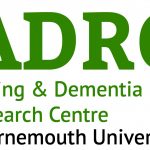

Health Education England (HEE) has commissioned Bournemouth University to deliver a new ‘‘Train the Trainers’ enhanced education programme called ‘Dementia Education and Learning Through Simulation’ 2 (DEALTS 2). This builds on previous work undertaken in 2013/14 by HEE to ensure healthcare professionals understand and can deliver key competencies according to the Dementia Core Skills Education and Training Framework at TIER 2 (Skills for Health and Health Education England, 2015).
Prof Jane Murphy, Dr Michele Board, Dr Michelle Heward and Ashley Spriggs from the Ageing and Dementia Research Centre (ADRC) delivered the first pilot session in Oxford on 10th May 2017. This interactive day was really well received and included attendance by Jan Zietara, Head of Operational Delivery, HEE; Jacqueline Fairburn-Platt, Associate Dean Quality Improvement, HEE Thames Valley as well as Dementia and Quality Improvement Leads. Over the next 2 months another 12 sessions will be delivered to trainers across the HEE regions in England. The delivery of the programme will be evaluated as well as the roll-out across England by the trainers themselves to staff to understand the impact the education is having on practice for the delivery of dementia care. In June the early evaluation work will be supported with the help of a Student Research Assistant, Laurie Emerson. Laurie is currently a final year psychology student in Faculty Sci Tech.


 ADRC and HEE showcase ‘DEALTS 2’ at ‘Dementia 2020: The Next Phase’ in London
ADRC and HEE showcase ‘DEALTS 2’ at ‘Dementia 2020: The Next Phase’ in London










 SPROUT: From Sustainable Research to Sustainable Research Lives
SPROUT: From Sustainable Research to Sustainable Research Lives BRIAN upgrade and new look
BRIAN upgrade and new look Seeing the fruits of your labour in Bangladesh
Seeing the fruits of your labour in Bangladesh Exploring Embodied Research: Body Map Storytelling Workshop & Research Seminar
Exploring Embodied Research: Body Map Storytelling Workshop & Research Seminar Marking a Milestone: The Swash Channel Wreck Book Launch
Marking a Milestone: The Swash Channel Wreck Book Launch ECR Funding Open Call: Research Culture & Community Grant – Application Deadline Friday 12 December
ECR Funding Open Call: Research Culture & Community Grant – Application Deadline Friday 12 December MSCA Postdoctoral Fellowships 2025 Call
MSCA Postdoctoral Fellowships 2025 Call ERC Advanced Grant 2025 Webinar
ERC Advanced Grant 2025 Webinar Update on UKRO services
Update on UKRO services European research project exploring use of ‘virtual twins’ to better manage metabolic associated fatty liver disease
European research project exploring use of ‘virtual twins’ to better manage metabolic associated fatty liver disease